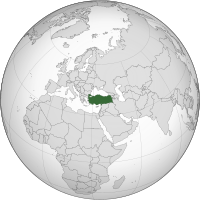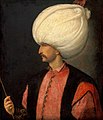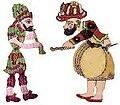Portal:Turkey
Merhaba! Türkiye portalına hoşgeldiniz. Hi! Welcome to the Turkey portal.
 | |

| |
Turkey, officially the Republic of Türkiye, is a country mainly in Anatolia in West Asia, with a smaller part called East Thrace in Southeast Europe. It borders the Black Sea to the north; Georgia, Armenia, Azerbaijan, and Iran to the east; Iraq, Syria, and the Mediterranean Sea (and Cyprus) to the south; and the Aegean Sea, Greece, and Bulgaria to the west. Turkey is home to over 85 million people; most are ethnic Turks, while ethnic Kurds are the largest ethnic minority. Officially a secular state, Turkey has a Muslim-majority population. Ankara is Turkey's capital and second-largest city; Istanbul is its largest city, and its economic and financial center, as well as the largest city in Europe. Other major cities include İzmir, Bursa and Antalya.
Human habitation began in the Late Paleolithic. Home to important Neolithic sites like Göbekli Tepe and some of the earliest farming areas, present-day Turkey was inhabited by various ancient peoples. Hattians were assimilated by the incoming Anatolian peoples. Increasing diversity during Classical Anatolia transitioned into cultural Hellenization following the conquests of Alexander the Great; Hellenization continued during the Roman and Byzantine eras. The Seljuk Turks began migrating into Anatolia in the 11th century, starting the Turkification process. The Seljuk Sultanate of Rum ruled Anatolia until the Mongol invasion in 1243, when it disintegrated into Turkish principalities. Beginning in 1299, the Ottomans united the principalities and expanded; Mehmed II conquered Istanbul in 1453. During the reigns of Selim I and Suleiman the Magnificent, the Ottoman Empire became a global power. From 1789 onwards, the empire saw major transformation, reforms, and centralization while its territory declined.
In the 19th and early 20th centuries, persecution of Muslims during the Ottoman contraction and in the Russian Empire resulted in large-scale loss of life and mass migration into modern-day Turkey from the Balkans, Caucasus, and Crimea. Under the control of the Three Pashas, the Ottoman Empire entered World War I in 1914, during which the Ottoman government committed genocides against its Armenian, Greek and Assyrian subjects. After its defeat, the Ottoman Empire was partitioned. The Turkish War of Independence resulted in the abolition of the sultanate in 1922 and the signing of the Treaty of Lausanne in 1923. The Republic was proclaimed on 29 October 1923, modelled on the reforms initiated by the country's first president, Mustafa Kemal Atatürk. Turkey remained neutral during most of World War II, but was involved in the Korean War. Coups in 1960 and 1980 interrupted the transition to a multi-party system.
Turkey is an upper-middle-income and emerging country; its economy is the 18th- or 11th-largest in the world. It is a unitary presidential republic. Turkey is a founding member of the OECD, G20, and Organization of Turkic States. With a geopolitically significant location, Turkey is a regional power and an early member of NATO. An EU-candidate, Turkey is part of the EU Customs Union, CoE, OIC, and TURKSOY. Turkey has coastal plains, a high central plateau, and various mountain ranges; its climate is temperate with harsher conditions in the interior. Home to three biodiversity hotspots, Turkey is prone to frequent earthquakes and is highly vulnerable to climate change. Turkey has universal healthcare, growing access to education, and increasing innovativeness. It is a leading TV content exporter. With 21 UNESCO World Heritage sites, 30 UNESCO intangible cultural heritage inscriptions, and a rich and diverse cuisine, Turkey is the fourth most visited country in the world. (Full article...)
Selected article -
While World War I ended for the Ottoman Empire with the Armistice of Mudros, the Allied Powers continued occupying and securing land per the Sykes–Picot Agreement, as well as to facilitate the prosecution of former members of the Committee of Union and Progress and those involved in the Armenian genocide. Ottoman military commanders therefore refused orders from both the Allies and the Ottoman government to surrender and disband their forces. In an atmosphere of turmoil throughout the remainder of the empire, sultan Mehmed VI dispatched Mustafa Kemal Pasha (Atatürk), a well-respected and high-ranking general, to Anatolia to restore order; however, Mustafa Kemal became an enabler and eventually leader of Turkish Nationalist resistance against the Ottoman government, Allied powers, and separatists.
In an attempt to establish control over the power vacuum in Anatolia, the Allies agreed to launch a Greek peacekeeping force into Anatolia and occupy Smyrna (İzmir), inflaming sectarian tensions and beginning the Turkish War of Independence. A nationalist counter government led by Mustafa Kemal was established in Ankara when it became clear the Ottoman government was appeasing the Allied powers. The Allies soon pressured the Ottoman government in Constantinople to suspend the Constitution, shutter Parliament, and sign the Treaty of Sèvres, a treaty unfavorable to Turkish interests that the "Ankara government" declared illegal. (Full article...)General images
Did you know -
- ... that Mevlüt Çavuşoğlu, the head of the Turkish delegation to the Parliamentary Assembly of the Council of Europe, is also a member of parliament from Antalya Province? (January 24, 2010)
- ... that ten days before the ratification of the Peace of Szeged, Vladislaus, King of Hungary, swore an oath which invalidated it and all future treaties with the Ottoman Empire? (May 25, 2007) Wikipedia:Recent additions 143
- ... that it was discovered that about 10,000 Muslim graves in Cebeci Asri Cemetery, Ankara, Turkey were not oriented in the direction required by Islam? (March 29, 2007) Wikipedia:Recent additions 130
- ... that the Gazi Race, named in honor of Gazi Mustafa Kemal, the founder of the Turkish Republic, was won by racehorses owned by succeeding presidents İsmet İnönü and Celâl Bayar? (December 8, 2011)
- ... that the military prowess of the Tulunid dynasty of Arab Egypt was due to its multi-ethnic army composed of Turkish, Sudanese, and Greek soldiers? (May 10, 2008) Wikipedia:Recent additions 219
- ... that the Şeyh Süleyman Mosque in Istanbul was almost certainly an annex of Constantinople's Monastery of Pantokrator in the Byzantine Age? (December 8, 2010)
- ... that the Turkish military coup of 1971 is known as a coup by memorandum? (August 10, 2004) Wikipedia:Recent additions 13
Selected picture
Selected biography -

Selected video -
Selected quote -
| “ | Today the Soviet Union is a friend and an ally. We need this friendship. However, no one can know what will happen tomorrow. Just like the Ottoman and Austro-Hungarian Empires it may tear itself apart or shrink in size. The people that it holds so tightly in its grip may one day slip away. The world may see a new balance of power. It is then that Turkey must know what to do. Ally Soviets have under their control our brothers with whom we share language, beliefs and roots. We must be prepared to embrace them. Being ready does not mean that we will sit quietly and wait. We must get ready. How does a people get prepared for such an endeavour? By strengthening the natural bridges that exist between us. Language is a bridge... Religion is a bridge... History is a bridge... We must delve into our roots and reconstruct what history has divided. We can't wait for them to approach us. We must reach out to them. | ” |
Recognized content
Provinces
Related portals
Religions in Turkey
Neighbouring countries
Countries with related heritage
WikiProjects
Turkish wikipedia
 |
There is a Turkish version of Wikipedia, the free encyclopedia. |
Wikimedia
The following Wikimedia Foundation sister projects provide more on this subject:
-
Commons
Free media repository -
Wikibooks
Free textbooks and manuals -
Wikidata
Free knowledge base -
Wikinews
Free-content news -
Wikiquote
Collection of quotations -
Wikisource
Free-content library -
Wikiversity
Free learning tools -
Wikivoyage
Free travel guide -
Wiktionary
Dictionary and thesaurus














































































































